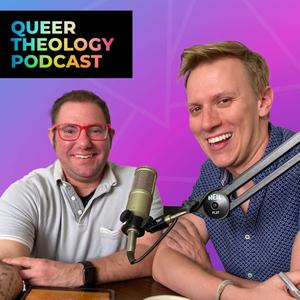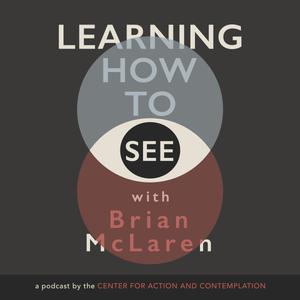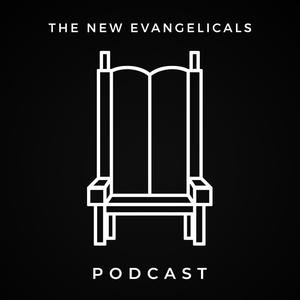
Queer Theology
Queer Theology / Brian G. Murphy & Shannon T.L. Kearns
An LGBTQ Christian perspective on a different Bible passage every week
- 50 minutes 29 secondsShame-Sex Attraction with Lucas Wilson
We are joined by author Lucas Wilson for this podcast episode to talk about his journey from being a former evangelical to a queer academic. Dr. Lucas Wilson is a SSHRC Postdoctoral Fellow at University of Toronto Mississauga, formerly the Justice, Equity, and Transformation Postdoctoral Fellow at University of Calgary. He is the editor of Shame-Sex Attraction: Survivors’ Stories of Conversion Therapy. He is currently working on two interrelated monograph projects that examine evangelical homophobia and transphobia in the U.S. discussing the intertwining of his faith and queer identity. In this conversation, he delves into the history and reality of conversion therapy, emphasizing the ongoing struggles faced by survivors. Lucas also reflects on the motivation behind his book, contrasting his academic work with personal narratives, and highlights common themes such as shame and secrecy in the stories of conversion therapy survivors. Our discussion aims to raise awareness about the continued existence of conversion therapy practices, despite legal prohibitions. Lucas also highlights the importance of sharing queer stories and finding hope beyond the struggles faced in high-control religious environments.
Takeaways
- Luke identifies as an ex-vangelical and conversion therapy survivor.
- His academic work focuses on queer history and the New Christian Right.
- Conversion therapy is often misunderstood as only occurring in specific settings.
- The term ‘conversion practices’ encompasses a broader range of experiences.
- Many queer individuals have undergone some form of conversion practices.
- Shame is a central theme in the experiences of conversion therapy survivors.
- Secrecy and silence are prevalent in the narratives of those affected.
- Luke’s book aims to shed light on the ongoing reality of conversion therapy.
- The collection includes diverse stories from various queer identities.
- Despite legal bans, conversion therapy practices continue to exist underground. Conversion therapy is a complex issue with many personal stories.
- Shame can persist even after leaving high-control religious groups.
- Academia can provide a space for critical thinking and self-discovery.
- Understanding Christian theology is essential to grasping US politics.
- The influence of evangelicalism on contemporary issues is significant.
- Stories of conversion therapy survivors often highlight resilience and hope.
- Not all stories have neat, happy endings; discomfort is part of the journey.
- Community support is crucial for those recovering from conversion therapy.
- Future projects aim to amplify queer voices and experiences.
- Personal joy can be found in simple pleasures, like enjoying grapes.
Chapters
(02:27) Faith and Queer Identity Intertwined
(08:42) Understanding Conversion Therapy
(12:51) The Motivation Behind the Book
(15:30) Contrasting Academic and Personal Narratives
(17:49) Common Themes in Conversion Therapy Stories
(22:08) The Ongoing Reality of Conversion Therapy
(23:07) The Impact of Conversion Therapy
(25:37) Shame and Self-Reflection
(26:07) Academic Awakening and Relearning
(30:20) The Role of Christian Theology in History
(31:52) Understanding Evangelical Influence on Politics
(38:41) Finding Hope Beyond Conversion Therapy
(43:27) Future Projects and Community Engagement
Resources:
- Follow Lucas on social media:
- IG: @lukeslamdunkwilson
- Threads: @lukeslamdunkwilson
- X/Twitter: @wilson_fw
- LinkedIn: https://www.linkedin.com/in/lucas-wilson-2a0753b1/
- TikTok: @lukeslamdunkwilson
- Facebook: https://www.facebook.com/luke.wilson.96
- Join the Sanctuary Collective Community
If you want to support the Patreon and help keep the podcast up and running, you can learn more and pledge your support at patreon.com/queertheology
EPISODE TRANSCRIPT
The post Shame-Sex Attraction with Lucas Wilson appeared first on Queer Theology.
19 January 2025, 11:55 am - 57 minutes 45 secondsTaking Another Look at Paul: An Interview with John Dominic Crossan
We’re excited to have return guest, John Dominic Crossan, on the pod this week to talk about his new book, “Paul the Pharisee: A Vision Beyond the Violence of Civilization.” We discuss the importance of matrix as a tool for understanding the context and background of texts and why that is so important when we look at Paul. Crossan emphasizes the role of metaphor in shaping our lives and how dismissing metaphor as less than literal impacts our theology. He explores the differences between ascension and resurrection and why they matter. He talks about how his book explores this distinction between ascension and resurrection, emphasizing the importance of focusing on the community of the human race rather than privileged individuals.
Takeaways
- Understanding the context and background of texts is crucial for interpreting and applying ancient documents to new situations.
- Paul’s significance and importance can be better understood by placing him in the historical and cultural context of the Roman Empire.
- Metaphor plays a powerful role in shaping our lives and creating reality. It is important to be aware of the metaphors we live by and their implications.
- Ascension and resurrection are two different concepts. Ascension is about special privilege for an individual, while resurrection is about the liberation of the human race from death.
- The Easter images in Western and Eastern Christian traditions depict different understandings of resurrection, with the Eastern tradition emphasizing the liberation of the human race. The focus should be on the community of the human race rather than privileged individuals.
- The evangelical conception of salvation should shift towards caring for the world and recognizing the role of evolution in running the world.
- Paul’s belief in resurrection shaped the behavior and community of early Christians.
- Reading Paul in the context of Roman imperial theology and studying Virgil’s Aeneid can provide a better understanding of the New Testament.
- Paul’s vision of cosmic justice and the implications of evolution are relevant for our world today.
Chapters
(04:03) Reevaluating Paul: Importance and Significance
(11:14) The Power of Metaphor in Shaping Reality
(14:37) Ascension vs. Resurrection: Different Concepts
(24:28) Easter Images: Western and Eastern Perspectives
(29:18) Focusing on the Community of the Human Race
(30:28) Challenging the Evangelical Conception of Salvation
(31:31) Recognizing the Role of Evolution in Running the World
(33:47) Taking Responsibility for the World
(35:12) Paul’s Vision of Resurrection and Cosmic Justice
(44:52) Understanding Paul in the Context of Roman Imperial Theology
(52:39) The Relevance of Paul’s Vision of Cosmic Justice and Evolution
Resources:
- Paul the Pharisee: A Vision Beyond the Violence of Civilization by John Dominic Crossan
- Join the Sanctuary Collective Community
If you want to support the Patreon and help keep the podcast up and running, you can learn more and pledge your support at patreon.com/queertheology
The post Taking Another Look at Paul: An Interview with John Dominic Crossan appeared first on Queer Theology.
12 January 2025, 11:55 am - 59 minutes 23 secondsHeading to the UnYeshiva with Judaism UnBound
A while back, we sat down with the hosts of the podcast, Judaism Unbound. So for this episode, we’re sharing that interview with y’all! In this interview, we talk about how to queer theology, share some of our favorite bible stories and discuss how to do this work well. We also touch on how other theologies, religions, and faith practices can enrich and impact our lives in a deeply meaningful way.
Resources:
- Learn more and join the course https://www.judaismunbound.com/2025-courses/p/queering-theology
- Listen to the Judaism Unbound podcast.
- Join the Sanctuary Collective Community
If you want to support the Patreon and help keep the podcast up and running, you can learn more and pledge your support at patreon.com/queertheology
EPISODE TRANSCRIPT
The post Heading to the UnYeshiva with Judaism UnBound appeared first on Queer Theology.
5 January 2025, 11:55 am - 1 hour 2 minutesExploring Spirituality Through Storytelling with Marques Hollie
Brian interviews Marques Hollie for this episode of the podcast. Marques Hollie (they/he), is an operatically-trained vocalist, ritual leader, and theatre-maker, who has been telling and singing stories for as long he can remember. Following a course of study in homiletics, liturgy, Torah exegesis, and the canon of Jewish stories, Marques received ordination as a Maggid (sacred storyteller). Currently, he is a student at the Reconstructionist Rabbinical College. Marques shares his journey as a queer clergy person who intertwines storytelling with spirituality. They discuss their experiences of coming out, exploration of faith, and how these elements have shaped their identity. We delve into the power of personal narratives, the significance of storytelling in understanding sacred texts, and the broader implications of these stories in personal transformation and community connection.
Takeaways
- Marques identifies as a queer clergy person who merges storytelling and music.
- The journey of queerness and faith is deeply intertwined for Marques.
- Storytelling can reveal deeper meanings in sacred texts.
- Personal narratives allow individuals to see themselves in larger stories.
- Queer sacred storytelling offers unique perspectives on tradition.
- The process of conversion to Judaism can be lengthy and reflective.
- Storytelling is a powerful tool for personal transformation.
- Everyone lives within their own stories, regardless of profession.
- Understanding the agendas behind texts can reshape our interpretations.
- Connection to sacred texts can be found through personal experiences. Midrash offers a possibility for diverse interpretations.
- Storytelling is a powerful tool for connection and education.
- Claiming one’s identity can transform personal and professional paths.
- The journey to becoming a rabbi can be unexpected and profound.
- Interfaith relationships challenge traditional boundaries in Judaism.
- Jewish leadership is evolving to be more inclusive.
- Creative energy thrives in liminal spaces of transition.
- Engaging with art and literature can deepen spiritual understanding.
- The importance of community in navigating personal journeys.
- Finding joy in simple pleasures can be a source of strength.
Chapters
(02:58) The Journey of Queerness and Faith
(05:57) Exploring the Intersection of Storytelling and Spirituality
(09:03) The Power of Personal Narratives
(11:58) Queer Sacred Storytelling and Its Impact
(15:02) Finding Connection in Sacred Texts
(18:01) The Role of Storytelling in Personal Transformation
(20:54) The Broader Implications of Storytelling
(23:58) Conclusion and Reflections on Storytelling
(31:03) Exploring Midrash and Queer Perspectives
(32:40) The Art of Storytelling in Jewish Tradition
(35:14) The Journey to Rabbinical Identity
(39:58) Navigating Interfaith Relationships and Rabbinical School
(45:05) The Evolution of Jewish Leadership
(49:45) Finding Joy in Liminal Spaces and Creative Energy
Resources:
- Learn more about Marques Hollie at https://www.marqueshollie.com/
- Join the Sanctuary Collective Community
If you want to support the Patreon and help keep the podcast up and running, you can learn more and pledge your support at patreon.com/queertheology
EPISODE TRANSCRIPT
The post Exploring Spirituality Through Storytelling with Marques Hollie appeared first on Queer Theology.
29 December 2024, 11:55 am - 29 minutes 3 secondsImagining New Worlds an interview with Eliot Schrefer
In this conversation, we speak with author, Eliot Schrefer, about his journey as a writer. We discuss his identity, influences, and the importance of queer representation in literature. He delves into his latest book, ‘The Brightness Between Us,’ and reflects on the creative process of adapting stories for film. Eliot emphasizes the significance of storytelling in providing hope and connection for LGBTQ+ youth, while also expressing his determination to keep producing this much needed content in the face of pushback from groups that want to ban books.
Takeaways
- Eliot’s journey to writing was influenced by his mother’s struggles as a writer.
- He discovered his passion for writing later in life after realizing it was his true calling.
- Young adult literature often lacked representation of LGBTQ+ experiences during Eliot’s youth.
- Eliot’s latest book explores themes of love and identity in a sci-fi setting.
- The creative process involves drawing inspiration from various sources while creating something original.
- Queer representation in literature is crucial for the mental health of LGBTQ+ youth.
- Eliot’s work has been positively received, with a growing demand for LGBTQ+ narratives.
- The adaptation of his book into a film is an exciting opportunity for broader reach.
- Eliot believes in the power of stories to provide hope and connection.
- He continues to be inspired by the need for inclusive narratives in today’s world.
Chapters
(00:00) Introduction to Eliot and His Journey
(02:57) Eliot’s Path to Becoming a Writer
(06:01) Influences and Inspirations in Young Adult Literature
(09:05) Exploring Eliot’s Latest Book: *The Darkness Outside*
(12:05) The Creative Process: From Inspiration to Storytelling
(14:53) The Importance of Queer Representation in Literature
(17:48) Adapting Books for Film: The Journey Ahead
(20:46) Finding Joy and Inspiration in Writing
(24:05) Closing Thoughts and Future Connections
Resources:
- Preorder The Brightness Between Us by Eliot Schrefer
- Learn more about Eliot Schrefer at https://www.eliotschrefer.com/
- Join the Sanctuary Collective Community
If you want to support the Patreon and help keep the podcast up and running, you can learn more and pledge your support at patreon.com/queertheology
EPISODE TRANSCRIPT
The post Imagining New Worlds an interview with Eliot Schrefer appeared first on Queer Theology.
22 December 2024, 11:55 am - 43 minutes 42 secondsQueer Affirming Therapy an interview with Ann Russo
We’re joined by Ann Russo, a queer therapist, who shares her journey of growing up in a queer household and navigating the complexities of identity, religion, and acceptance. She discusses the challenges faced by LGBTQ individuals in religious spaces, the importance of support systems, and the impact of religious trauma. Ann emphasizes the need for therapists to be transparent and knowledgeable about LGBTQ issues and offers insights into finding the right therapist. Our conversation highlights stories of transformation and the significance of intergenerational relationships within the queer community.
Takeaways
- Ann Russo identifies as a queer therapist passionate about the intersection of identity, trauma, and spirituality.
- Growing up in a queer household in the 80s was challenging due to societal prejudice and fear of violence.
- Ann initially resisted her queerness, wanting to ‘pray the gay away’ until she embraced her identity in high school.
- Religion was not a positive force in Ann’s upbringing, leading to curiosity about its teachings later in life.
- Ann immersed herself in conservative Christian spaces to understand the messaging against LGBTQ individuals.
- The transition from fear to acceptance involved social justice activism and creating safe spaces for LGBTQ youth.
- Religious trauma can create barriers for LGBTQ individuals seeking acceptance in progressive religious spaces.
- Support systems, including chosen family and older queer mentors, are crucial for healing and acceptance.
- Finding a therapist who understands the intersection of queerness and religion is essential for LGBTQ individuals.
- Transformation stories highlight the resilience of LGBTQ individuals and the importance of community support.
Chapters
(00:00) Introduction to Queer Identity and Therapy
(03:02) Growing Up in a Queer Household
(05:47) The Intersection of Religion and Queerness
(09:01) Navigating Religious Spaces as a Queer Person
(12:00) Transitioning from Fear to Acceptance
(15:03) Understanding Religious Trauma
(17:54) The Importance of Support Systems
(21:13) Finding a Therapist for LGBTQ Issues
(23:56) Stories of Transformation
(27:10) The Role of Intergenerational Relationships
(30:06) Closing Thoughts and Resources
Resources:
- Learn more about Ann Russo’s work at https://www.annrusso.org/
- Accessible therapy at https://www.amrtherapy.com/
- Join the Sanctuary Collective Community
If you want to support the Patreon and help keep the podcast up and running, you can learn more and pledge your support at patreon.com/queertheology
EPISODE TRANSCRIPT
The post Queer Affirming Therapy an interview with Ann Russo appeared first on Queer Theology.
15 December 2024, 11:55 am - 39 minutes 4 secondsThe Importance of Visibility An Interview with Chris Tompkins
In this interview, author, advocate, and therapist Chris Tompkins shares his personal journey of self-discovery as a gay man raised in a religious environment. He discusses the challenges of reconciling his identity with his faith, the impact of religious trauma, and the importance of awareness in parenting to support LGBTQ+ children. Chris talks about why he wrote his book, “Raising LGBTQ Allies,” and emphasizes the need for open conversations and practical strategies for parents to create a supportive environment for their kids, ultimately leading to a more inclusive society.
Takeaways
- Chris was raised in a religious family with conflicting beliefs.
- He experienced religious trauma and internalized homophobia.
- His coming out journey was deeply intertwined with love and acceptance.
- Chris emphasizes the importance of awareness in parenting.
- Parents can inadvertently perpetuate fear-based associations.
- Books and open conversations can help educate children.
- Creating safe spaces for discussions is crucial.
- Understanding societal messages is key to supporting LGBTQ+ kids.
- Chris’s book aims to help parents change harmful narratives.
- Healing from religious trauma is a journey that requires introspection.
Chapters
(02:40) Chris’s Journey of Self-Discovery
(10:13) Reconnecting with Faith and Spirituality
(16:32) Understanding Religious Trauma
(22:30) The Importance of Awareness in Parenting
(27:54) Supporting LGBTQ+ Kids: Practical Strategies
(35:00) Conclusion and Resources
Resources:
- Learn more at https://www.aroadtriptolove.com/
- Raising LGBTQ Allies: A Parent’s Guide to Changing the Messages from the Playground by Chris Tompkins
- Join the Sanctuary Collective Community
If you want to support the Patreon and help keep the podcast up and running, you can learn more and pledge your support at patreon.com/queertheology
EPISODE TRANSCRIPT
The post The Importance of Visibility An Interview with Chris Tompkins appeared first on Queer Theology.
8 December 2024, 11:55 am - 24 minutes 52 secondsThe Cool Christians an Interview Jeff Hiller (Somebody Somewhere)
We’re kicking off our winter guest series with an interview with Jeff Hiller, a hilarious actor and comedian in NYC, best known for his role as Joel in the Peabody Award-winning HBO show ‘Somebody Somewhere.’ If you haven’t watched this show yet, be sure to check it out! In this conversation, Jeff Hiller discusses his role in the show, exploring themes of authenticity, community, and the intersection of queerness and faith. Jeff reflects on his character Joel, who navigates life in a small town while fostering connections and grappling with personal ethics. We talk about the evolution of queer representation in media and the importance of finding joy in everyday moments.
Takeaways
- ‘Somebody Somewhere’ is about authenticity and real life.
- Joel’s character reflects the complexities of queerness in small towns.
- Faith in the show is portrayed as a source of community, not oppression.
- The journey of faith for Joel is more about ethics than belief.
- Jeff’s personal experiences shaped his understanding of community and queerness.
- The representation of queer characters has evolved significantly in media.
- There is a need for more diverse queer representation on screen.
- Joy can be found in simple, everyday moments.
- The show challenges traditional portrayals of faith and queerness.
- Community and kindness are central themes in both the show and Jeff’s life.
Chapters
(00:00) Introduction to Jeff Hiller and Somebody Somewhere
(02:49) Exploring Joel’s Character and Authenticity
(06:03) Faith, Community, and Queerness in Small Towns
(09:03) The Journey of Faith and Ethics
(11:59) Personal Experiences with Queerness and Community
(15:03) The Evolution of Queer Representation on Screen
(18:03) Joy in Everyday Life and Closing Thoughts
Resources:
- Follow Jeff on IG @boomboomhiller
- Watch Season 3 of Somebody Somewhere on HBO
- Join the Sanctuary Collective Community
If you want to support the Patreon and help keep the podcast up and running, you can learn more and pledge your support at patreon.com/queertheology
EPISODE TRANSCRIPT
The post The Cool Christians an Interview Jeff Hiller (Somebody Somewhere) appeared first on Queer Theology.
1 December 2024, 11:55 am - 20 minutes 40 secondsThe Misunderstood Mystical Meaning of Advent
As we head into the Christmas season, we invite y’all to really explore the meaning and significance of Advent. There is so much richness and depth to this tradition and (especially now!) it is a moment to reflect on what our role in this world is. We discuss the themes of waiting, anticipation, and introspection that characterize this season, as well as the importance of recognizing the realities of the world and dreaming of a better future. There is so much potential for personal and communal transformation during Advent.
Takeaways
- Advent is a time of preparation leading up to Christmas.
- It involves themes of waiting, anticipation, and introspection.
- Advent invites us to reflect on what is not working in the world.
- The season encourages dreaming about justice and peace.
- Rituals during Advent help make visible what is not yet tangible.
- Advent is a liminal space for personal and communal transformation.
- The end of the year is a time for intention setting and reflection.
- Queering Advent allows for a deeper connection to spirituality.
- The journey through Advent can be inclusive for all backgrounds.
- Community engagement during Advent enhances the experience.
Chapters
(00:00) The Significance of Advent
(10:12) Advent as a Time for Reflection and Introspection
(18:11) Queering the Advent Experience
Resources:
- Join the Sanctuary Collective Community and be part of our Queering Advent event
- Soul Safe and Rewrite Your Story are both on-demand workshops available in Spiritual Study Hall
If you want to support the Patreon and help keep the podcast up and running, you can learn more and pledge your support at patreon.com/queertheology
EPISODE TRANSCRIPT
The post The Misunderstood Mystical Meaning of Advent appeared first on Queer Theology.
24 November 2024, 11:55 am - 19 minutes 35 secondsHow To Handle Fraught Situations
It’s that time of year when we often see family and need to navigate complex family dynamics. During the holiday season, this is particularly true for queer individuals. We talk about the importance of setting boundaries, and the necessity of prioritizing personal comfort over traditional expectations. We’re big proponents of self-care! And that can definitely look like setting clear boundaries that make you feel safe and happy during a time that can be fraught with anxiety and discomfort.
Takeaways
- The holiday season can evoke feelings of angst and anxiety for many individuals, especially around family dynamics.
- Setting firm boundaries can help mitigate holiday-related stress.
- Even after coming out, feelings of discomfort around family can persist.
- Juggling multiple family traditions can increase holiday stress.
- It’s important to prioritize personal comfort over traditional expectations during the holidays.
- Choosing to spend the holidays in a way that feels good is not selfish.
- Self-care and introspection are crucial during the holiday season.
- It’s okay to not participate in family traditions that feel uncomfortable.
- Small changes can lead to a more positive holiday experience.
- The process of navigating family dynamics is ongoing and requires experimentation.
Chapters
(00:00) Navigating Family Dynamics During the Holidays
(05:59) The Impact of Identity on Family Interactions
(11:01) Choosing Personal Comfort Over Tradition
(14:52) Self-Care and Reflection During the Holiday Season
Resources:
- Join the Sanctuary Collective Community and be part of our Queering Advent event
- Soul Safe and Rewrite Your Story are both on-demand workshops available in Spiritual Study Hall
If you want to support the Patreon and help keep the podcast up and running, you can learn more and pledge your support at patreon.com/queertheology
EPISODE TRANSCRIPT
The post How To Handle Fraught Situations appeared first on Queer Theology.
17 November 2024, 11:55 am - 21 minutes 17 secondsThe Messy Scandal of Ruth
We’re queering the Book of Ruth in this episode of the Queer Theology Podcast. And y’all, this one can get really scandalous! We delve into its themes of agency, chosen family, and the complexities of tradition. Then we also discuss how the narrative can be interpreted through a queer lens, highlighting the scandalous elements often sanitized in traditional readings. Sometimes you gotta engage with scripture in a way that acknowledges the messiness and complexities to really get to the good stuff! As we head into Advent, this can be a time of deep reflection and looking at scripture through a queer lens can be a liberating practice.
Takeaways
- The Book of Ruth contains themes of agency and vulnerability.
- Ruth’s actions can be seen as scandalous yet empowering.
- Chosen family is a significant aspect of the narrative.
- The story challenges traditional interpretations of relationships.
- Sanitizing scripture does a disservice to its complexity.
- Queer readings of scripture can reveal deeper meanings.
- Tradition is often rooted in messy and complicated stories.
- Engaging with scripture requires acknowledging its messiness.
- Community journeys can enhance spiritual reflection.
- Advent offers a time for introspection and preparation.
Chapters
(00:00) Introduction and Context of the Conversation
(01:12) Exploring the Book of Ruth
(03:30) Queering the Text: Scandal and Agency
(06:56) Chosen Family and Queer Relationships
(11:51) The Messiness of Tradition and Scripture
(15:35) Invitation to Engage with Scripture
(16:42) Queering Advent: A Community Journey
Resources:
- Join the Sanctuary Collective Community and be part of our Queering Advent event
If you want to support the Patreon and help keep the podcast up and running, you can learn more and pledge your support at patreon.com/queertheology
TRANSCRIPT
The post The Messy Scandal of Ruth appeared first on Queer Theology.
10 November 2024, 11:55 am - More Episodes? Get the App
Your feedback is valuable to us. Should you encounter any bugs, glitches, lack of functionality or other problems, please email us on [email protected] or join Moon.FM Telegram Group where you can talk directly to the dev team who are happy to answer any queries.
 The Bible For Normal People
The Bible For Normal People
 Almost Heretical
Almost Heretical
 You Have Permission
You Have Permission
 Learning How to See with Brian McLaren
Learning How to See with Brian McLaren
 The New Evangelicals Podcast
The New Evangelicals Podcast
 Homebrewed Christianity Podcast
Homebrewed Christianity Podcast